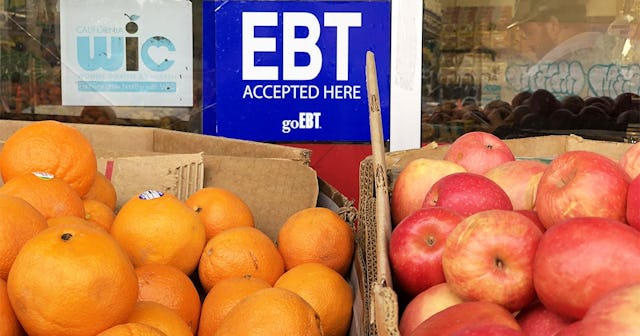Avoid Grocery Shopping In The Beginning Of The Month To Help Families In Need

By avoiding shopping in the early days of the month, you’ll be helping at-risk moms and children who use WIC
If you’re looking for ways to help folks who have been negatively impacted by the COVID-19 crisis, there’s actually one simple thing you can do right now: Don’t go grocery shopping at the beginning of the month.
The first few days of the month are crucial for mothers who depend on WIC (the Special Supplemental Nutrition Program for Women, Infants, and Children) to be able to buy food to feed their families. Why exactly? Well, WIC funds are always disbursed at the beginning of the month. And since during this time many families have been buying in bulk in order to decrease the amount of times they need to go shopping, shelves are often left bare after the grocery store’s morning rush.
This is especially detrimental for those who depend on WIC to buy food, as Dallas magazine explains. The mission of the WIC program is to protect low-income women (who may be pregnant, postpartum, or breastfeeding), infants, and children up to five years old who are at risk of not getting the proper nutrients they need. The bottom line? These parents were already at-risk and vulnerable before COVID-19.
It’s important to note that WIC doesn’t just allow someone to get whatever kind of food they want. When a mother uses her WIC card, she’s limited to certain authorized products and brands. According to the USDA, this includes food such as eggs, vitamin-enriched juice, baby food, whole wheat bread, canned beans, peanut butter, milk, and infant formula. Many of these products like eggs, bread, canned beans, and peanut butter are usually the first to fly off shelves — and that leaves moms who use WIC in an even tougher, more susceptible spot.
By waiting until the fourth of every month, you’re giving mothers in need a chance to bring home food for their families.
If already you’ve seen this call-to-action on your social media feeds, that’s because it originates from a Facebook message that was posted on March 30 by Adam Medrano, Dallas County’s councilman. He wrote, “I urge everyone to avoid grocery shopping on April 1-3, unless you have a critical need. WIC benefits come to low-income families the first of the month and there will be a surge as these families redeem them.”
Medrano also brings up the point that families are counting on these benefits to stock up on food because kids have been mandated to stay at home from school. These children may have been part of a free or discounted lunch program at school. Now, with their homes as the only sources for food, children are at risk for going hungry when food is depleted faster.
“Many of these families’ benefits were depleted more quickly because children are staying at home from school and families are going hungry right now,” Medrano writes. He ends his message by stating, “Give these families space to shop and please respect their needs by not buying items with a WIC shelf tag unless you absolutely need them.”
Since the message was posted, people have taken to Twitter to spread the word. Some are reminding the community that, along with the WIC program, those who are receiving SNAP (Supplemental Nutrition Assistance Program) benefits, also need the extra time and space to get the food they need for their families.
Along with avoiding grocery store visits in the beginning of the month, remember to choose products that don’t have the WIC or SNAP labeling on them if you can. It’s a small act of kindness, but a powerful one that goes a long, long way.